This guest post comes from my friend David Hughes, who learned some hard lessons about urban homesteading while surrounded by less-than-supportive neighbors. He’s scaled up since he wrote this post for me, and now raises chickens, meat rabbits, and more. Drop by his Facebook page, see what he’s up to, and say hi from the NWEdible community.
Divert waste from the landfills. Build fertility in your garden – or donate the compost to someone who will use it. Close as much of the soil nutrient cycle as we can without humanure composting.
All of these are great reasons to compost. When composting in an urban environment, however, expect complaints – and even code violations – if you don’t take care when designing your system.
I learned my urban composting lessons the hard way. Here’s a few things I wish I had known.
Know the Rules Before You Start
Code violation fines for rogue piles of organic matter can run over a hundred dollars a day in many municipalities. If you want to compost in a way that’s against the rules and hope you won’t get detected, you’ll typically get a warning before you can be fined.
I was thankful for this when I got my first code violation notice. I had started composting a few months earlier but didn’t take the time to research rules – I just assumed that a standard 3-side open composting bin was legal because I knew residents doing it without issue.
The period to correct the violation was quite short. Coming up the time and money to build a large box enclosed with hardware cloth was stressful with my life situation at the time.
My enclosed compost bin was approved by the city. But a year later, when a complaint about rat activity in the neighborhood came up, my bin was – with no evidence – fingered as the source of the problem.

Even if the code agrees with you, the person who interprets the code might not.
Remember that ordinances are subject to interpretation. What your inspector approves, their supervisor can interpret as a violation. I explained to the city office that, both my reading and the inspector’s reading of the composting ordinance saw me in compliance. The supervisor saw it differently and a new code violation order was issued.
When dealing with code violations in many jurisdictions you can’t even appeal without paying for the right to a hearing.
Keep It Secret, Keep It Safe
The difficulty I have with my property is that it is a corner lot that’s only 1/12th of an acre. Every single corner of the lot is easily seen from street or sidewalk.
If you’re going to start composting, figure out a way to hide it, even if you think your system meets code. Code compliance is subjective but people can’t complain about what they don’t see.
In my city I know of several gardeners who compost with completely open piles and have had zero issues with the authorities. Their compost can’t be seen except by one or two neighbors who could peer over a fence, and those neighbors are okay with it.
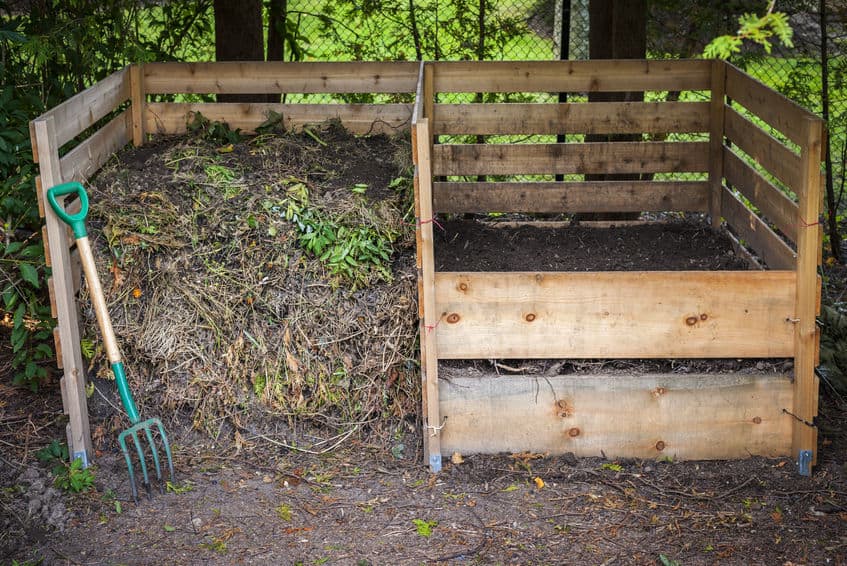
Essential gardening activity to us, public nuisance to the neighbors.
In comparison, last year my compost bin was stuffed full of garden debris at the end of the season. I piled what couldn’t fit next to the bin, waiting for the pile to naturally break down and compact. Less than a week letter, I got yet another code violation notice because of the debris sitting outside waiting to be composted. Anonymous busybody neighbors can make your life a living hell.
Once again: people can’t complain about what they don’t see.
Evaluate Your Options
One possible solution is privacy fencing. Though very good at blocking prying eyes, privacy fencing can create unwanted shade – hampering efficient use of precious productive gardening space – and is expensive.

If grass is the only socially acceptable choice, you might need a solid fence.
Another option is trench composting, where you dig a trench and then cover up the material you want to compost as you fill it in. This takes a garden spot out of commission for the season but as long as the scraps are well-covered, animals hopefully won’t dig and reveal what you’ve been doing.
For smaller volumes of compost you can take a galvanized metal trash can, drill ½” holes in the bottom and partway up the sides, then bury it up to the holes in the side. Let the neighborhood worms find it or stock it with some red wrigglers. Provide some smaller diameter holes in the lid for ventilation. From a distance this looks like an ordinary trash can.
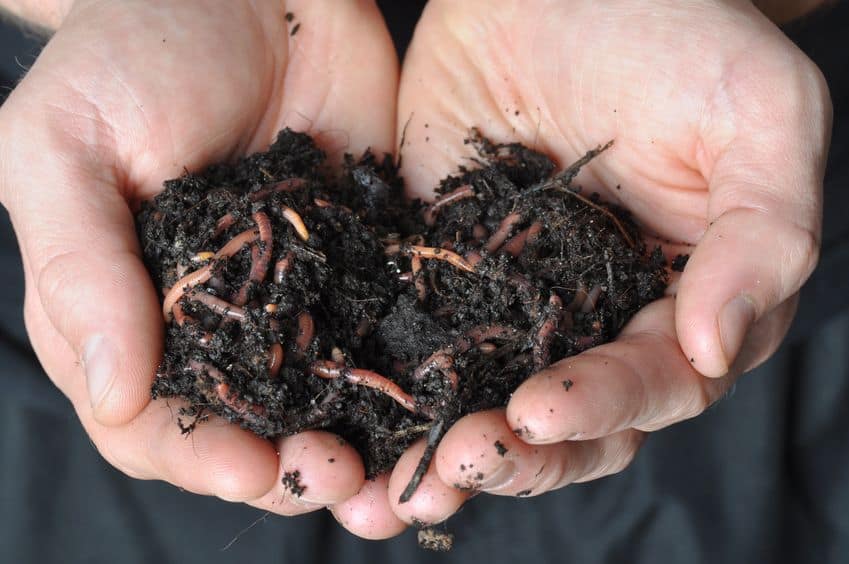
Buried composting and vermicomposting systems can be very stealthy.
The problem with this system, like more typical vermicomposting systems, is that you either have to stop composting during winter in cold climates or have a backup place to stash frozen food scraps and other compostables.
Use Animals When At All Possible
I’ll be adding chickens to our urban homesteading this year. Nearly everything I was putting through my compost pile will instead be fed to the chickens first. I’m hoping that the manure-straw combo will not only make better compost, but also look less like “garbage” to whichever neighbor(s) keep complaining about my compost activity.
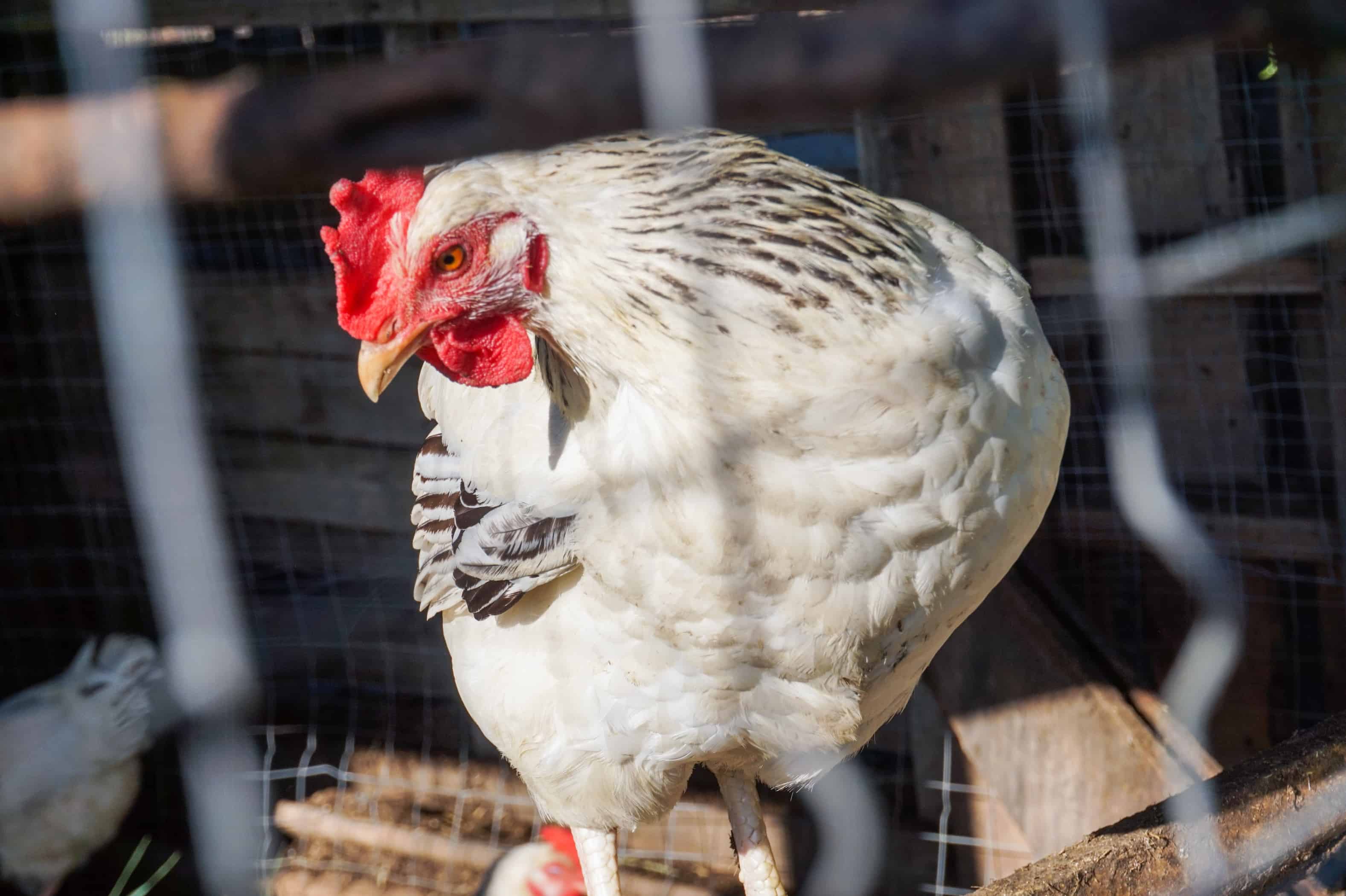
Chickens are a huge help with composting if the code allows them.
While chicken manure is too “hot” to add directly to a garden bed in use, here in Wisconsin we have long periods of inactivity in the garden. Friends of mine who keep chickens here apply the litter during fall cleanup of the garden beds and by the time spring arrives the bed is ready to plant.
This works best when using the deep litter method, since you’re only cleaning out the coop and run on a periodic basis. The language in my particular city’s chicken ordinance is potentially not favorable to deep litter so if an issue comes up, it may be easier for me to compost the litter and then apply it to beds throughout the season.
Use a Service or Drop off Compostables Off-Site
This keeps compostable waste out of landfills but typically you won’t get any right to finished compost in return, so for avid gardeners or urban homesteaders this can be a deal-breaker. Even if you do get some finished compost, you won’t have control over what went into it.
Dropping off compostables isn’t very convenient unless there’s a site nearby. Services that pick up your compostables, on other hand, can be expensive. Expect to pay anywhere from $5-$10 a week.
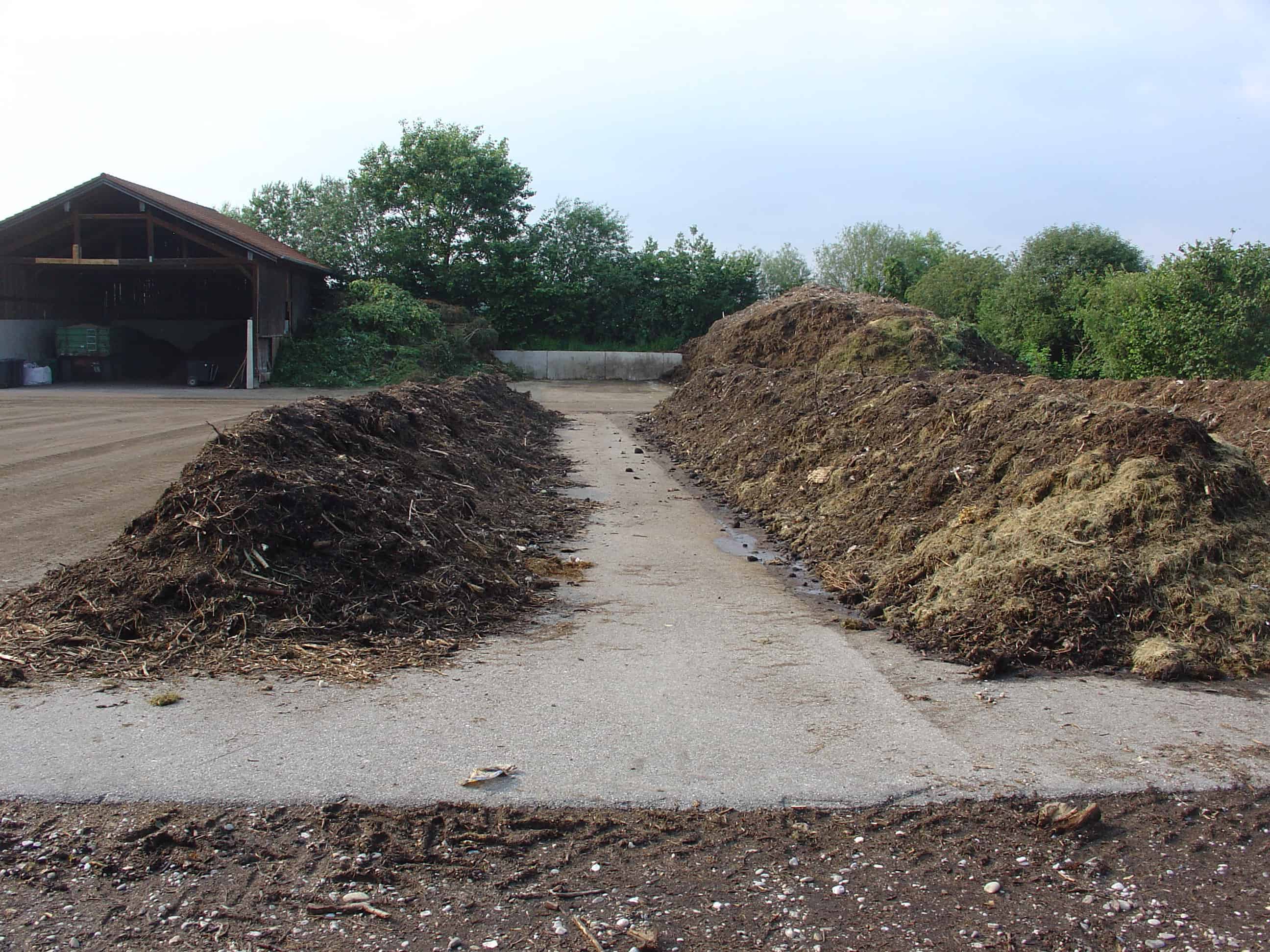
A community composting site in Germany. Source
Hopefully your composting experience has been more positive than mine. If you’ve been composting in an urban environment, how’s it been? If negative, what creative solutions have you used? Has anyone been forced to give up composting for good?
31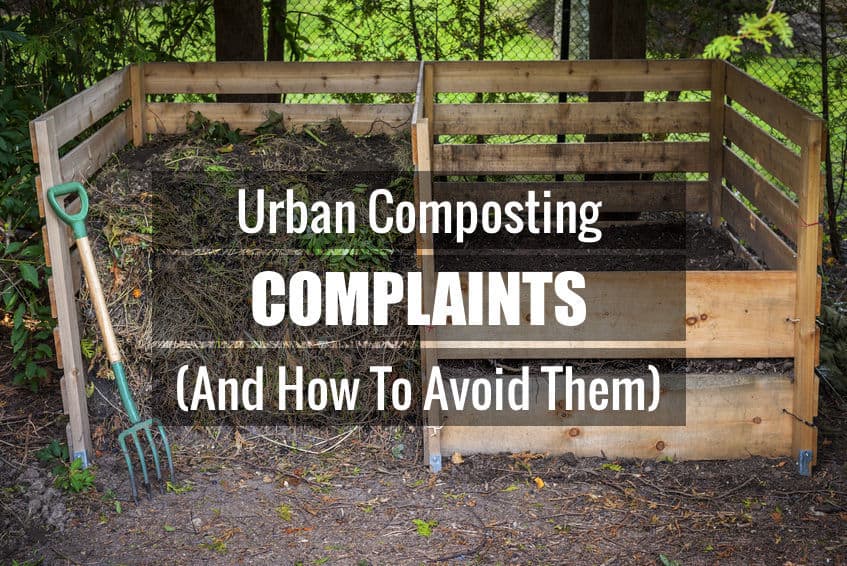
Sounds like you have crappy neighbors. One thing I love about my neighborhood of solid working class (we’re talking those who belong to the Union in their manufacturing jobs type of folks) is that they have a “mind your own business, especially if it isn’t hurting anyone” but totally there when you need to borrow a tool or need a helping hand to get a window installed, or belt on a riding lawnmower changed. Although rumor has it that chickens aren’t officially allowed in my town (I didn’t bother to ask the town officials) I know several of my neighbors have turned a blind eye to my small “gardening shed” at the back of my property that houses my five hens. Guess it helps that I’ve handed over the fence eggs from the girls and tomatoes from the garden, and even offered wheelbarrows full of mulch from trees I had taken down. Yay for great neighbors, boo for crappy ones.
A friend of mine described my neighorhood as not trendy enough to be full of hippies (though a lot of people do like our setup) but not working-class enough that people couldn’t care less.
I’ve been a dedicated composter for 35 years but I currently compost in a closed composter. Rats, rats, rats! Even when I open composted only yard waste (no veg garden matter or food scraps) rats seemed to like tunneling under the warm pile. From my experience the two biggest backyard attractions for rats are open compost sites and bird feeders, or rat feeders as I call them.
Growing up we had an open compost pile, no problems. Where I am now, I’ve had a compost pile for 19 years, no problems. My current one is an enclosed system, but the rodents had no problem accessing. But rodents are a huge problem here, nothing gets rid of them, other than predators, cats, owl, hawks. Always suburban. Privacy fencing is the norm here, standard on the west coast. I would hate to be without it.
Am planning to move to the country in 2 years, am looking forward to an open system, bins are a pain to turn.
We actually just ended up building a privacy fence a couple weeks ago and so far are really happy we did it. It will double as supports to hang rabbit cages for our budding rabbitry.
I was going to suggest maybe building a chainlink fence and then hanging something like shade cloth on it as a privacy filter without blocking all the sun, but I see your comment about already building a fence. Course that probably wouldn’t pass code requirements either!
I’m lucky enough I’m rural. Not only can I open pile compost without worry, I get to smell the manure spread on the nearby farm fields!
Hah, no, this time I made sure to check the rules and got the fence permit first 😉
Guess we’re lucky to have a city (and sanitation company) that allows compostibles to be mixed with the rest of the “yard waste” that’s picked up 2x a month. They truck it all to a regional composting facility (which happens to be 20 min from my house) where it’s processed on an industrial scale. They work rows of compost that are 15-20ft tall and at least 100yd long. You can buy it back as finished compost at $20/yd dumped into your truck or trailer with a large front-end loader.
More expensive than free compost but $20/yd is quite reasonable. A lot of the suburban municipalities around my city have free or discounted compost programs like that, though usually it’s yard waste compost only, not kitchen waste as well.
Oh I feel for everyone who can’t do something as basic as compost in their own backyard! And it makes me thankful for the area I live in. Years ago municipalities were pushing backyard compost bins, and since then most have introduced curbside compost pick-ups – the cost of which is included/hidden in our taxes (along with garbage and recycling).
My Phinneywood neighbors were the WORST nimbies. I own an ’01 Dodge 2500. It is a functional work vehicle, but I had a commuter car. If my truck was in ANY spot for more than 72 hours, they called the police. Ridiculous terrible people. Oh, and the looks I got in the PCC parking lot. People, how do you think agricultural happens?
Anyways…I can bitch and moan about life in the 253, but my neighbors let me do whatever I want.
Also, do you sill have your tumbler? Has it held up to our damp weather?
This is definitely slightly off topic but you seem like an expert on the topic. I have a dog and pick up her waste with compostable dog bags. Same material those small kitchen compost bags are made of. I put the used ones in my compost bin (seattle picks up compost) and the workers wrote in permanent marker no dog waste on my compost bin… why is dog waste in a biodegradable bag not ok for city composting??
If the compost doesn’t either A) get very hot or B) get aged for a period of at least 12-24 months post-finish, dog manure potentially harbors a lot of dangerous pathogens to humans. Primarily T. gondii. The danger level is similar to our own manure. Humanure can totally be safely composted but they probably just don’t want the liability and/or their facility isn’t set up to have piles ageing that long.
Just went over to your facebook page–you are doing all this on 1/12 acre (she says feeling like the world’s biggest underachiever)?
This is an issue I’ve thought a lot about. I moved from a farm, where I had chickens, goats, and a huge composting operation, to my parents’ condo, where I help care for them. It drove me crazy to throw away food scraps, because you can’t typically compost in a condo. Finally, I started stealth composting recently, with a vermicompost bin in the basement (where my elderly parents seldom venture anymore), and a Compost Sak on the back patio, where I’m composting garden scraps. (I’m stuck with lawn, but there is a yard-wide band of landscaping around our unit that I garden in.) I couldn’t believe how effective the Compost Sak is in getting things cooking quickly. It’s made of the same porous black material as fabric plant pots are, it’s just bigger. There’s no lid, you just fold it over, but the breathable fabric means lots of oxygen, so things really heat up quickly (and my sak is not even in the sun). So it doesn’t look like a compost pile yet is a very effective one. It might look like just a bag of leaves, but it’s much neater, so might avoid the prying gaze of nosy neighbors. I’d still recommend investing in privacy fencing with neighbors like yours, though.
I’m not urban, so no one sees my compost, but we’ve tried several variations on the pile/enclosure/buried with bricks on top because next doors Staffy always finds it. And is persistent enough so make his way under the fence and into, over, through or under most things. We made one this week with a sheepyard panel, stakes, chickenwire round the outside of it and reinforcing mesh as a temporary lid. It made a lovely dog trap!
Luckily I’m not organic. I get wood chips from the city transfer station. drench the cubic yard I get with about 7 pounds of commercial urea fertilizer dissolved in water. If anyone asks, it’s for garden paths I haven’t done yet.
What’s that? Why is my woodchip pile perking along at 140 degrees? None of your business.